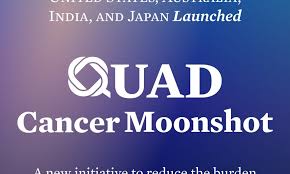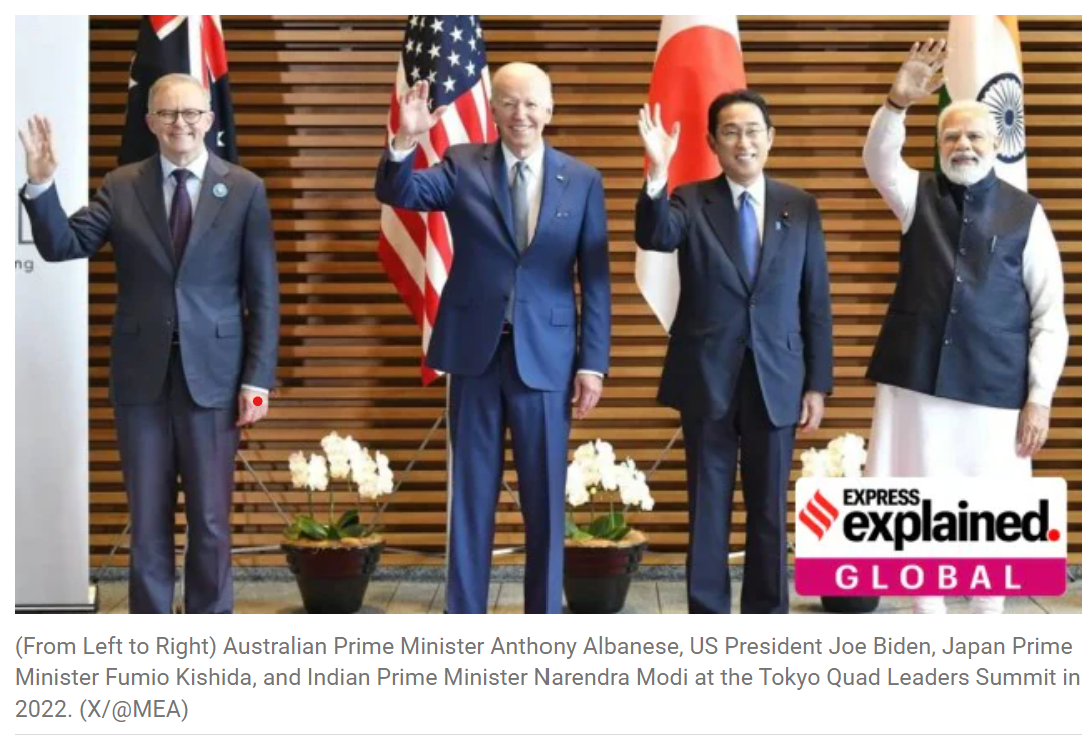QUAD CANCER MOONSHOT

- 23 Sep 2024
In News:
The Quad Cancer Moonshot Initiative is a significant collaborative effort among the Quad countries—India, the United States, Australia, and Japan—aimed at combating cancer through innovative strategies. The initiative focuses on key areas such as preventing and detecting cancer, improving treatment, and alleviating the disease's impact on patients and families.
Key Highlights of the Quad Cancer Moonshot Initiative:
- Focus Areas:
- Cervical Cancer Screening: Enhancing access to screening programs.
- HPV Vaccination: Increasing vaccination rates against HPV, which is the leading cause of cervical cancer.
- Patient Treatment: Improving treatment protocols and accessibility for cancer patients.
- India’s Contributions:
- Financial Commitment: India has pledged $10 million to support the WHO’s Global Initiative on Digital Health, aimed at enhancing digital health technologies for cancer care in the Indo-Pacific region.
- Material Support: India will provide cervical cancer screening kits, detection tools, and HPV vaccines valued at $7.5 million to bolster healthcare initiatives in the region.
- AI-based Protocols: Development of AI-driven treatment protocols to improve care delivery for cancer patients.
- Capacity Building: India aims to enhance radiotherapy services and overall cancer prevention strategies in the Indo-Pacific.
This initiative represents a strong commitment to fostering international collaboration in healthcare, particularly in the prevention and treatment of cervical cancer. By empowering communities with accessible tools and resources, the Quad countries aim to significantly reduce the burden of cancer in the region.
QUAD GROUPING

- 22 Sep 2024
In News:
Prime Minister Narendra Modi arrived in the United States, where he will participate in the fourth Quad Leaders Summit in Wilmington, Delaware.
What is the Quad Grouping?
The Quad, or Quadrilateral Security Dialogue, is an informal strategic alliance comprising India, the United States, Japan, and Australia. Originally formed in response to the Indian Ocean tsunami in 2004, the Quad aims to foster collaboration in various areas, but its primary focus has become countering the influence of China in the Indo-Pacific region.
Historical Background
- 2004: The Quad began as a response to the Indian Ocean tsunami, facilitating disaster relief.
- 2007: Japanese PM Shinzo Abe formalized the alliance.
- 2017: Amid rising Chinese assertiveness, the Quad was revitalized, expanding its objectives beyond maritime security.
Structure and Characteristics
- The Quad is not a formal organization; it lacks a secretariat or permanent decision-making body like the EU or UN.
- It focuses on strengthening bilateral and multilateral ties among member nations.
- Unlike NATO, the Quad does not include collective defense provisions but conducts joint military exercises to demonstrate unity.
Key Developments
- In 2020, the Malabar naval exercises expanded to include Australia, marking the first joint military exercises of the Quad since its resurgence.
- The first in-person summit took place in Washington, D.C. in 2021.
Objectives of the Quad
The Quad has outlined several primary objectives:
- Maritime Security: Ensuring safe and open sea routes in the Indo-Pacific.
- Climate Change: Addressing environmental challenges collaboratively.
- Investment Ecosystem: Creating opportunities for economic investment in the region.
- Technological Innovation: Promoting advancements and cooperation in technology.
- Public Health: Collaborating on initiatives like vaccine diplomacy during the COVID-19 pandemic.
Expansion and Future Directions
The Quad members have discussed expanding the partnership to include countries like South Korea, New Zealand, and Vietnam. In a joint statement, they reaffirmed their commitment to a free, open, resilient, and inclusive Indo-Pacific governed by international law.
Challenges and Opposition
China views the Quad as an effort to encircle and contain its influence. Beijing has criticized the grouping, labeling it as a strategy that incites discord among Asian nations.
